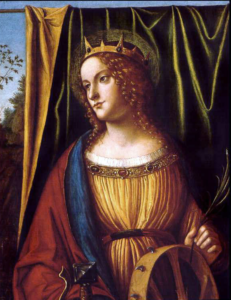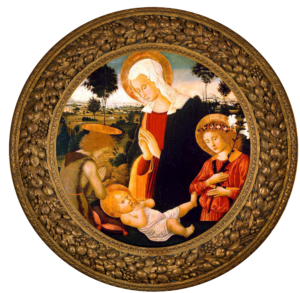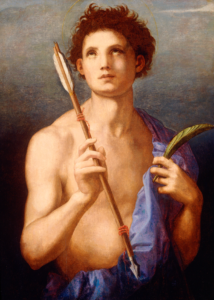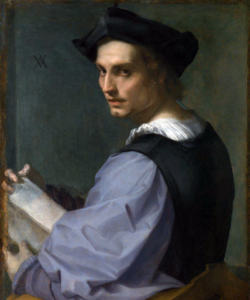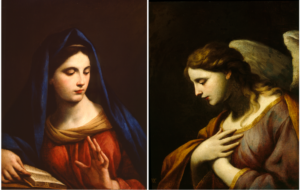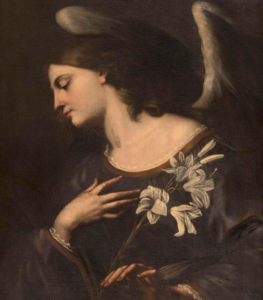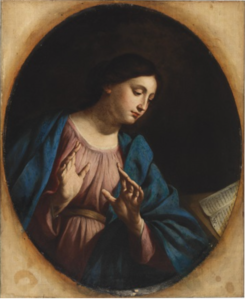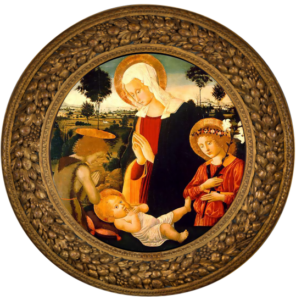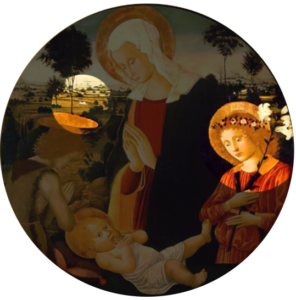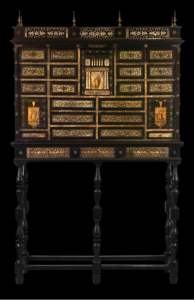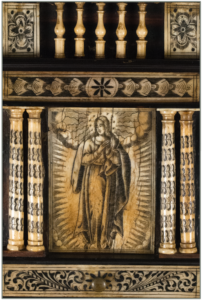St. Catherine of Alexandria
Oil on panel
Francesco Casella
Italian, active 1517
The legend of St. Catherine of Alexandria is found first in The Golden Legend a compilation of the lives of saints, actual and legendary, published in 1275. Catherine, an Egyptian princess, vows to keep her virginity for a mystical marriage to Christ. When the Emperor Maxentius requires pagan worship, Catherine refuses and when confronted with fifty scholars to convince her, ends up converting them! She is condemned to death by torture on a razor-studded wheel.
Though St. Catherine is often painted in other scenes of her life and with other attributions speaking to her erudition, Casella here portrays only the iconographic signs of her martyrdom: the palm, the halo, and the wheel. In the legend, St. Catherine is spared the wheel through angelic intervention, but she achieves the martyr’s crown through decapitation shown by the sword hilt at the bottom of the portrait. Clearly, the work’s purpose, indicated by the three-quarter figure size and lack of significant background, is to elevate Catherine as a saint and a devotional example to follow. Women in the church found her to be a role model of devotion to God, an example of sacrificial faithfulness to truth, and a mentor in the quest for learning.
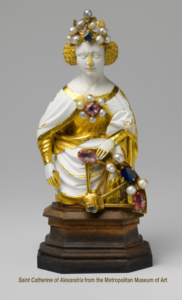 Catherine’s elegant dress and costly jewels may be an indication of the artist’s familiarity with other renditions of the saint in enamel figures. Those works have pearls and sapphires on both the saint’s dress and crown. A close look at the painting reveals that the jewels on her dress could be sapphires, befitting her station as royalty, with the central stone perhaps a ruby marking her as a “virtuous woman.” Her queen’s crown is adorned with the same sapphire-like jewels surrounded by three pearls, likely an indication of the Trinity.
Catherine’s elegant dress and costly jewels may be an indication of the artist’s familiarity with other renditions of the saint in enamel figures. Those works have pearls and sapphires on both the saint’s dress and crown. A close look at the painting reveals that the jewels on her dress could be sapphires, befitting her station as royalty, with the central stone perhaps a ruby marking her as a “virtuous woman.” Her queen’s crown is adorned with the same sapphire-like jewels surrounded by three pearls, likely an indication of the Trinity.
Catherine had much to keep her in this world—position, power, and potential. Yet she gazes away from the earthly. As a modern Magdalen, she contemplates a world outside the palace, a view made possible by a partially drawn velvet curtain. The earthy green reflects the mortal life, the gold reverse a heavenly one. Surely the landscape she contemplates outside the window is not the palace grounds, but that “city whose builder and maker is God.” Golden streets lie waiting for the victorious saint’s feet.
Catherine’s gaze at the eternal rather than the temporal creates the devotional thrust of this M&G portrait. She models the goal of the Christian: keep one’s eyes on the eternal prize. There is something to be said for an objective examination of what one wants to have lived—and died—for. Francesco Casella’s portrait, characterized by what Mina Gregori calls “major monumentality… [and] refined, pictorial sharpness,” presents a view of the ideal.
Dr. Karen Rowe Jones, M&G board member and volunteer
References:
Young, Bonnie. “A Jewel of St. Catherine.” https://www.jstor.org/stable/3258995
Published 2023
